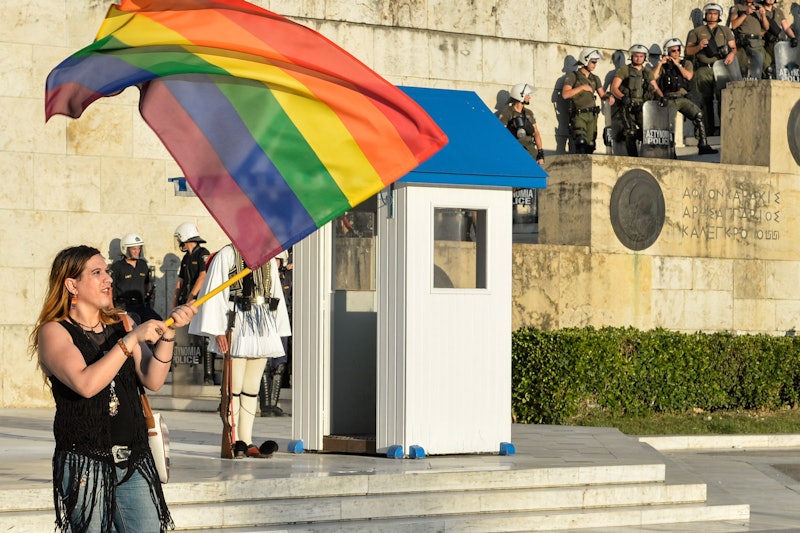When it comes to gender and sexuality, Sweden has always been ahead of the game. In a new, progressive move to be more inclusive of non-cisgender communities, Swedish Facebook has introduced "hen," a gender-neutral pronoun — along with a whopping 70 other non-binary options, including "transkille," which translates to "trans guy," and "ickebinär," which means non-binary. The change was perfectly timed with Stockholm's gay pride festival, which is known to be the biggest pride festival in all of Scandinavia. We already knew that Sweden is considered the best place for LGBTQ folks in the region — and thanks to the new Facebook addition, we've added one more reason why to the list.
In 2012, Sweden introduced "hen" and revolutionized the way people understood and referred to gender in the country. When "hen" finally made its way to the Swedish National Encyclopedia, it really started to gain momentumwith ; gendered toys, language, and clothing began declining, and within months, several children's books featuring protagonists who used teh gender-neutral pronoun had been published.
Although the United States might not be quite as progressive a Sweden, we do still have several non-binary pronouns in our vernacular: Many people choose to use "they/them/theirs," for example, while others will use "zi/zir/zim" in order to avoid "he" or "she." Though these pronouns aren't officially recognized, many universities have implemented them to make their learning environments more successful for students. As of last year, Facebook in the U.S. has also had a wide variety of non-binary gender identities available for users, including "agender," "genderfluid," and "genderqueer." The point, ultiamtely, is this: Non-binary gender identities are finally being acknowledged across the globe, and that is a very, very good thing.
As YouTuber Justin Dennis notes in the video "How Many Genders Are There?", there are a lot of reasons it's important to recognize non-binary gender identities — which is also why it's so important that these identities have finally begun appearing on social media. Here are just three of them, among countless others:
1. Not Everyone Identifies As Male or Female
There are countless gender identities in the world, and it's a bit silly and naive to think that "male" and "female" are the only two ways you can identify yourself. Though cisgender people may have a gender identity and performance that aligns with the sex they were assigned at birth, this is certainly not the case for all people — and to force non-cis/non-binary folks into those roles is inhumane, whether that's on social media, at school, in athletics, or elsewhere. As Justin Dennis says, gender is like a color spectrum: There are an endless number of ways to identify, just as there can be an endless number of colors. In fact, gender can even exist outside of a spectrum! It's more complicated than just male and female.
2. It Will Help Raise Awareness of Non-Binary Genders
One way to help people understand non-binary gender identities is to give them the language to do it. There are undoubtedly people out there who haven't even heard the terminology for genders that aren't "male" or "female," which might make it difficult to conceptualize and understand anything different. When people use non-binary genders and pronoun on Facebook, it shows other users that this is indeed a possibility; furthermore, it helps bring the identity or concept of alternate gender identities into the mainstream, which will hopfeully facilitate learning about them. Of course, not understanding does not excuse bigotry or discriminattion, but education — especially on social media platforms where there are millions of users consuming lots of information — to end discrimination is a positive thing.
3. Gender and Gender Roles Are a Social Construction
No, there is nothing inherently girly about wearing a skirt or boyish about having short hair. There's nothing inherently masculine about AXE shower gel, and there's nothing inherently feminine about Venus razors. There's nothing biologically driving females to like the color pink, nothing biologically prompting males to like the color blue, and nothing forcing any gender to pick a certain type of toy. We socially construct these standards for a lot of reasons: human desire for pattern recognition, marketing, and sadly sometimes systematic oppression. By shedding light on these issues on social media, the millions of people who use the platforms can be exposed to the idea of gender as a social construct and slowly start to grasp it.
Maybe someday (in my dream world), people will understand that the binary system is problematic, not just for gender, but for things like race, sexuality, politics, and social issues. In this world, everyone will revolt, dismantle the system of gender and the oppression it has caused, and emerge free to express themselves however they want. Until this utopia forms, though, adopting new ways to express gender and sexuality and integrating them into spaces with a lot of people present — both young and old — is a pretty good step to take
Images: Giphy (4)
